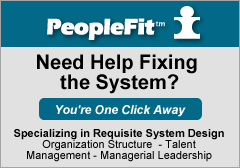Speaking of Faulty Assumptions – A Friday Funny
By Michelle Malay Carter on November 14, 2008
We’ve been talking about faulty assumptions and problem framing this week.??When we misfire on root cause, we can harm people with misguided?”therapies”.??
What conclusion do you jump to when you see the image below?? Invest 10 seconds to see if you are right.
?
?
Filed Under Requisite Organization | 1 Comment
Requisite Weekend Transformation? How Are You Framing Your Organizational Issues?
By Michelle Malay Carter on November 12, 2008
 Folklore has it that Elliott Jaques, the author of the meta model, Requisite Organization, used to say you could transform an organization over the weekend by restructuring an organization to align with the requisite model.
Folklore has it that Elliott Jaques, the author of the meta model, Requisite Organization, used to say you could transform an organization over the weekend by restructuring an organization to align with the requisite model.
Requisite Organization Design Principles
That means, among other things,?re-aligning as necessary to meet the three requisite organization design criteria.
Conceptually this is true, but because one’s current cognitive capability is a moving target and because it’s not the only criteria for job matching, an organization simply could not make itself requisite over the weekend.? We have a client who has been steadfastly shifting toward this goal for three years and still isn’t there.
Transform One Employee
However, on a micro-level, reassigning one person from a non-requisite situation to a requisite one could make a dramatic difference over night.? It can transform an underutilized?attitude problem into a star performer.
Too Simple to Believe
Many people dismiss the Requisite Model because, when broken into its elements, it appears just too simple to believe.? How could we be so ignorant of something so paramount to organization design and employee engagement, i.e. work levels, that has been right under our noses but unarticulated and hence not exploited for our benefit for as long as hierarchies have existed?
Right Brain, Left Brain and Dysgraphia, ADD, ADHD, etc.
My 10 year old son has dysgraphia,meaning he struggles with spelling and the physical act of writing (although he can verbalize a story with an adult vocabulary).? He also fits the criteria for ADD.? There are all kinds of theories on dysgraphia’s cause, and almost no therapies, only accommodations.? Although well meaning, none of my son’s doctors, school teachers or special ed teachers have been able to help, and some of their grueling but useless?”therapies” (more practice in the same manner) have actually harmed his attitude toward learning.?
How often do we?submit employees to useless and grueling “therapies” (can you say training?)?due to faulty assumptions?
Overnight Spelling Transformation
When I began through my own internet research to suspect a right brain – left brain integration issue, and I framed his struggles in that manner, I discovered a promising writing therapy and a right brain spelling technique?that has transformed his ability to spell overnight.? Now, with one minute of “studying” a word with his eyes and converting it to an image?(NOT WRITING the word as a sequence of letters which is a left brain methodology), he can spell sesquipedalian, not only forward, but backwards as well.
Your Problem Statement Frames Your Solution – Care to Take the High Road?
We all know that how you frame a problem sets the course for your solution.? If you believe that people desire to work (within their giftings) and will do a competent job (if the system doesn’t get in their way).? If you believe people are not inherently greedy, but do desire fair pay for their role.? If you believe, I’m OK, You’re OK, let’s fix the system, the Requisite model is worth exploring.? It?aligns with the human nature?high road.? It’s a road I travel daily.
Your thoughts?
Filed Under Corporate Values, Employee Engagement, Executive Leadership, Felt Fair Compensation, Requisite Organization, Work Levels | 6 Comments
Requisite Organization Resources – Talent Management, Accountability, and More
By Michelle Malay Carter on November 10, 2008
 For those of you interested in Requisite Organization,?Don and Bonnie Fowke, management consultants from the New Management Network, are hosting a weekly internet radio show exploring various management topics and methodologies.
For those of you interested in Requisite Organization,?Don and Bonnie Fowke, management consultants from the New Management Network, are hosting a weekly internet radio show exploring various management topics and methodologies.
Below are summaries of their last two shows.? You can access them here.
Talent Management
Don Fowke of Toronto explores how a talent management program ensures companies have succession in place to support growth strategies and how it assists employees to achieve career ambitions.
Accountability in Organizations
Everyone wants accountability but no one wants to hold anyone to account. Herb Koplowitz, President of Terra Firma Management Consulting in Toronto, explores the benefits of accountability, why it is so rarely practiced, and what needs to happen for accountability to add to organizational effectiveness, efficiency and trust.
I’m OK.? You’re OK.? Let’s fix the system.
Filed Under Accountability, Executive Leadership, Managerial Leadership, Requisite Organization, Talent Management | 4 Comments
Male Boss or Female Boss? A Friday Funny
By Michelle Malay Carter on November 7, 2008
As a blogger I try to not only to be an observer of human and organizational behavior but also?to offer practical, actionable solutions to all that ails organizations. ?
Warning – The clip below?is merely a comedian’s observations with no actionable content whatsoever.? You can take it for what it is – a hoot!? Or you can actually work on a Friday by using your judgment and discretion to figure out how to make this actionable in your workplace (or kitchen).? If you come up with something, let me know.
I try to keep my clips to less than a minute, but this one is worth all five. Thanks to my neighbor, Laurette Gibson, for this great find.
?
Filed Under Requisite Organization | Comments Off on Male Boss or Female Boss? A Friday Funny
The Employee Contract – Are We Buying Outputs or Renting Capability?
By Michelle Malay Carter on November 4, 2008
 Expanding upon my last post on managerial accountability … when you hire an employee, my friend and colleague Herb Koplowitz says, “You are renting employee capability not buying outputs.”
Expanding upon my last post on managerial accountability … when you hire an employee, my friend and colleague Herb Koplowitz says, “You are renting employee capability not buying outputs.”
Herb helped write the FAQ section for the Global Organization Design Society which has just redesigned its website.? Check it out here.? It has a large,?free video and text library to which many generous Requisite Organization researchers, consultants and practitioners have donated their work and their expertise via interviews.
Here’s a quote from the FAQ section?on Pay for Performance:
“The employee is paid for the level of effectiveness he or she contributes to the system. This is not pay for results or for performance, if by “performance” one means output. (If you want to buy output from a person, make them a supplier or an agent.)
What you are “renting” from an employee is their capability. It is up to the manager to direct that capability towards tasks of the manager’s choosing (after considering the employee’s advice). This is why the manager is accountable for the employee’s output.”
Simple isn’t it?? I’m OK.? You’re OK.? Let’s fix the system.? Your thoughts?
Filed Under Accountability, Requisite Organization, Strategy, Talent Management | 2 Comments
Managerial Accountability Is Not Missing; It’s just MISPLACED
By Michelle Malay Carter on October 29, 2008
 Last week I pointed you to an article by Samuel A.?Culbert, Get Rid of the Performance Review.? I thought it was well written, but I’m not in 100% agreement with some of his proposed solutions, particularly around accountability.
Last week I pointed you to an article by Samuel A.?Culbert, Get Rid of the Performance Review.? I thought it was well written, but I’m not in 100% agreement with some of his proposed solutions, particularly around accountability.
Culbert says, “The alternative to one-side-accountable, boss-administered/subordinate-received performance reviews is two-side, reciprocally accountable, performance previews.”
Performance Previews
I often talk about the meta-model, Requisite Organization?as being a total systems model for organizational structure and managerial leadership.? Within that frame of the Requisite model, what Culbert describes as performance previews, I see as the manager’s setting context and providing clear and specific task assignment to include necessary resources to accomplish the task.?
I’m on board with this, when using a Requisite leadership framework, these are clear and specific managerial leadership accountabilities, and these should be the beginning steps in a performance management cycle.
Yes, the employee-manager relationships needs to be a two-way, trusting and productive relationship, but making the manager and employee jointly accountable for employee output is not the way to do it.
Trust and Fairness – Precursors to Employee Engagement
Two precursors to employee engagement are trust and fairness.? If your systems don’t reinforce these to core human values, employees will not engage (give their discretionary effort).? Fear-inducing and unjust environments kill engagement.
Back to Culbert:
Further, Culbert says, “I claim that the boss-direct report team should be held jointly accountable for the quality of work the subordinate performs.”? Emphasis mine.
Joint Accountability – Warning, Warning!
Here is where I disagree.? Whenever we move to joint accountability, it opens the door to buck passing and finger pointing.? When things go well, we want credit.? When things go wrong, we always have a scapegoat.?? It is dangerous to misplace accountability like this.
Employee Accountability
Yes, employees have an accountabilities.? It is to bring their full effort to bear on their assignments, to keep their managers informed on progress, problems,?opportunities and threats,?and to give their manager their best advice.? They can be held accountable for using appropriate judgment.? Beyond that, there is not much else they can do.
Culbert’s Solution isn’t Radical Enough
I’m going the same place as Culbert but getting there a different route.? Culbert is upset by managers who?blame their direct reports for poor performance when the managers play such a critical role in their direct reports’ success.? I agree that this is an outrage.? But I’m going for something more radical and more just than dual accountability for employee output.
Managerial Accountability
Are you ready?? Managers should be held accountable for the output of their team (and in order to be accountable they must be given certain authorities as well in order to induce trust and fairness).?
Why?? The managers create the direct report role, they hire for it, they assign the tasks, they are accountable for seeing their direct reports have the knowledge, skills and experience needed, they supply the resources, the coach and provide feedback, they judge employee effectiveness, and ultimately, they remove employees who are not performing as needed.? Given this, how could it be just or trust-inducing to hold an employee accountable for their output when the manager holds nearly all the influence “levers”.
Managerial Leadership
Managers must make judgments about employee’s effectiveness.? Employee output is a factor but can never be a sole determinant of one’s effectiveness.? Why?? I could meet my output goal but put the company in jeopardy doing so.? Conversely, I could miss my output goal despite heroic effort and sound judgment.? Managers must judge employee effectiveness in light of the prevailing circumstances.? This is the essence of managerial leadership work.
Objectiveness is a Charade
Effectiveness appraisal of direct reports?will never be objective, much to the chagrin of attorneys.? When we try to make it so by attaching number to our judgments, it sets loose all forms of corruption.
This is the hard work of managerial leadership.? Getting to know your team, assigning tasks appropriately, monitoring them, MAKING JUDGMENTS, and providing feedback.? Managers are paid to make the best use of their team toward getting work done.
Looking at Culbert’s reciprocal accountability model which implies an almost equal partnership between manager and employee, I have to ask myself, why would a manager in this arrangement get paid more than the employee??
Change is Necessary
Yes, change is necessary, but Culbert didn’t go far enough.? His best intentions did not net a best practice, and once put into practice, many unintended consequences will erupt.
The American Delusion – Examine Your Core Belief
In America, we have deluded ourselves into thinking we are “king of the world” and that we have much more control and influence over our destiny than we do.? This mentality has spilled over into the workplace.? We proudly and tenaciously believe we are accountable for our output.? Trying to control something over which we have very little control is a fast track to anxiety and all its consequences.
Leadership Gut Check Time
Now, step back and examine that core belief.? Do you think it is fair for you to be held accountable for your output rather than your effectiveness??
On one hand, it might be depressing to admit just how vulnerable we are to our managers’ competence?when it comes to our ability to be effective at work.? On the other hand, it is very liberating to recognize that you might just be a dog chasing its tail.
I’m OK.? You’re OK.? Let’s fix the system.
Your thoughts?
Photo Credit:? Jeremiah Owyang
Filed Under Accountability, Corporate Values, Employee Engagement, Executive Leadership, Managerial Leadership, Requisite Organization, Talent Management | 13 Comments
Leadership Gut Check – Performance Reviews
By Michelle Malay Carter on October 23, 2008
 Eschew the Performance Review
Eschew the Performance Review
I wrote earlier this week about best intentions not leading to best practices.? Even if we were to grant that performance reviews started with the best of intentions – they have wandered dangerously off course.
Deming argued against them back in his day.? I’ve argued against them myself.? But this Machine is a monster, and I don’t suspect our attorneys will let them go away any time soon.? The charade that reviews are objective supposedly keeps the lawsuits down.
Using my Leadership Gut Check Questions I offered on Monday for analysing systems, take a look at your performance review system and see how it fairs.
?
A Well Written Look at the Insanity of Performance Reviews
Samuel A.?Culbert offers Get Rid of the Performance Review in this week’s Wall Street Journal online.? It’s worth checking out.? Although I don’t 100% agree with his solution, I think he’s got the arguments for why they should be reworked.
I’m OK.? You’re OK.? Let’s fix the system.
Filed Under Accountability, Managerial Leadership, Requisite Organization, Talent Management | 2 Comments
Best Intentions Don’t Equal Best Practices – Ask the Bigger Questions of Your Systems
By Michelle Malay Carter on October 20, 2008
 I believe in people.? Their inherent goodness.? Their desire to contribute.? To do well by themselves and others.? But clearly, this does not always translate into best practices.? Sometimes to do right by ourselves, our systems force us to do wrong by others.
I believe in people.? Their inherent goodness.? Their desire to contribute.? To do well by themselves and others.? But clearly, this does not always translate into best practices.? Sometimes to do right by ourselves, our systems force us to do wrong by others.
Whoa!? Where Did?We Go?
Many times we start out doing something for a good reason, but over time the process becomes distorted and the reason for the process gets lost – like a photo copy becoming less clear with each generation of copy.? We end up with something so convoluted we can’t even remember the point, but yet we continue to go with it.? Unquestioned.
Whoops!? How Did This Happen?
Or we do things for a good reason, and then there are unintended consequences.?? Unfortunately, often?the consequence of admitting to the destructive power of the unintended consequences is that we must admit we were wrong or we made a mistake which can be career suicide.? So the consequence of that is we cover up the unintended consequence or we deny them.? Oh, what a tangled web we weave.
Control and Audit
We can’t just create a system and let it flow in perpetuity.?? We must establish owners for our systems.? We must have feedback loops.? We must audit our systems with an eye toward frequent tweaks before we are so off course that no one can stop the beast.? (Can you say global financial crisis?)
We have to ask the bigger questions of our systems.?
- Are they netting the consequences we intended??
- Are they driving the behaviors we desire??
- Do they reflect our espoused values??
- Are they trustworthy and fair?
- Have we drifted off course?
A Quiz
Bring to mind any people system within your organization (recruiting, development, succession/promotion, compensation, performance management, managerial leadership), and ask the five previous questions of it.?
Systems often Reinforce Cowardice
Are we willing to check our egos at the door and admit mistakes?? Are we willing to cut our losses on a dysfunctional system to restore our integrity?? Do we have systems in place that allow this type of courageous behavior?? If not, why not?
I’m OK.? You’re OK.? Let’s fix the system.
How did you score on your quiz?
Filed Under Accountability, Corporate Values, Executive Leadership, Requisite Organization | 4 Comments
Late-Breaking Candidate Proclaims: “I’m OK, You’re OK, Let’s Fix the System”
By Michelle Malay Carter on October 17, 2008
 I always tell my kids, stop being part of the problem and become part of the solution.? So I took my own advice.
I always tell my kids, stop being part of the problem and become part of the solution.? So I took my own advice.
Click here to view my 90-second video.?? (For the life of me, I couldn’t get the video to embed.)
Thanks for PalTalk for this Friday Funny.
Filed Under Executive Leadership, Strategy | Comments Off on Late-Breaking Candidate Proclaims: “I’m OK, You’re OK, Let’s Fix the System”
Where is the Leadership Wisdom? Hiding with Waldo
By Michelle Malay Carter on October 15, 2008

 Have you played the game, Where’s Waldo?? The point is to search an incredibly cluttered image and isolate Waldo, who is hiding amongst the debris.?Can you find Waldo in the image to the left?
Have you played the game, Where’s Waldo?? The point is to search an incredibly cluttered image and isolate Waldo, who is hiding amongst the debris.?Can you find Waldo in the image to the left?
We Don’t Need More.? We Need Discernment
When it comes to leadership wisdom, it’s a little like Where’s Waldo.? There is more than enough writing on the subject (not as much science based research), but the key is to discern the actual truth and/or wisdom from the clutter.
The Attitude Platitude
So much of what is out there rests upon the premise that we can “think” our way to better organizations.? If everyone just had a better attitude, all our problems would be solved.?
Newsflash:? Systems drive behavior and telegraph values.? If you’ve got issues, examine your systems.?
Micro Solutions Can’t Work without being Combined with a Macro Viewpoint
Back to leadership, the only total systems approach to managerial leadership and organizational structure?I know of is Elliott Jaques’ Requisite Organization.? Although it has been around for 20 years and its roots go back 50, not many have been able to separate it from the clutter.? Why?
Can’t I Just Pop a Pill?
It’s akin to the solution to maintaining a healthy weight – diet, exercise, a healthy lifestyle.? Yes, that will get you the result you want, but it takes discipline and determination.? It requires foregoing a “quick fix” in deference to higher principle.?
Most people continue to experiment with short-term panaceas such as the coffee enema and grapefruit diet plan?rather than systematically redesigning their lifestyle with healthy processes and habits.
Most executives are lining employees up for coffee enemas when an integrated leadership framework design and implementation is what is called for.? Then, they blame their employees for not embracing the enema.
Do You Know Any Geniuses in Your Corner of the World?
In my tiny corner of the management and leadership world, I personally have met two geniuses whose brilliant work goes unnoticed in the clutter, the late Elliott Jaques and Warren Kinston’s work on values and hierarchies?is vast and valuable (pardon the pun).? What a shame.? What a waste.
What Else Is Humanity Being Denied?
I often wonder, if I know two people whose work goes unrecognized but whose work could contribute greatly to society,?how many genius bodies of work go unnoticed in the clutter?? Not just in the leadership field but in all fields.?
What medical developments are being ignored by the mainstream field because they defy the closely held paradigms of the machine?? I’ve mentioned before that I think the fair tax is genius but the US tax industry and our congress have a huge vested interest in seeing it silenced.
A Call for Leadership
Until Executives are willing to put forth the courage, determination, discipline, and resource investment that it takes to forego the short-term Wall Street nod in deference to a truly healthy, sustainable organization, we will continue to see engagement levels at all time lows and a shaky economy.
I’m OK.? You’re OK.? Let’s fix the system.
What are you seeing in your corner of the world?
Filed Under Corporate Values, Executive Leadership, Requisite Organization | 2 Comments
